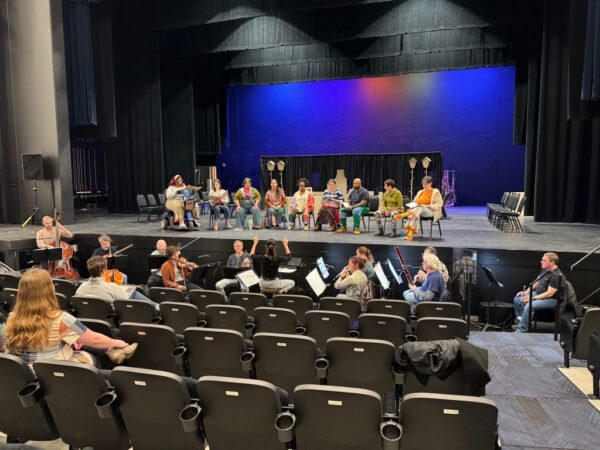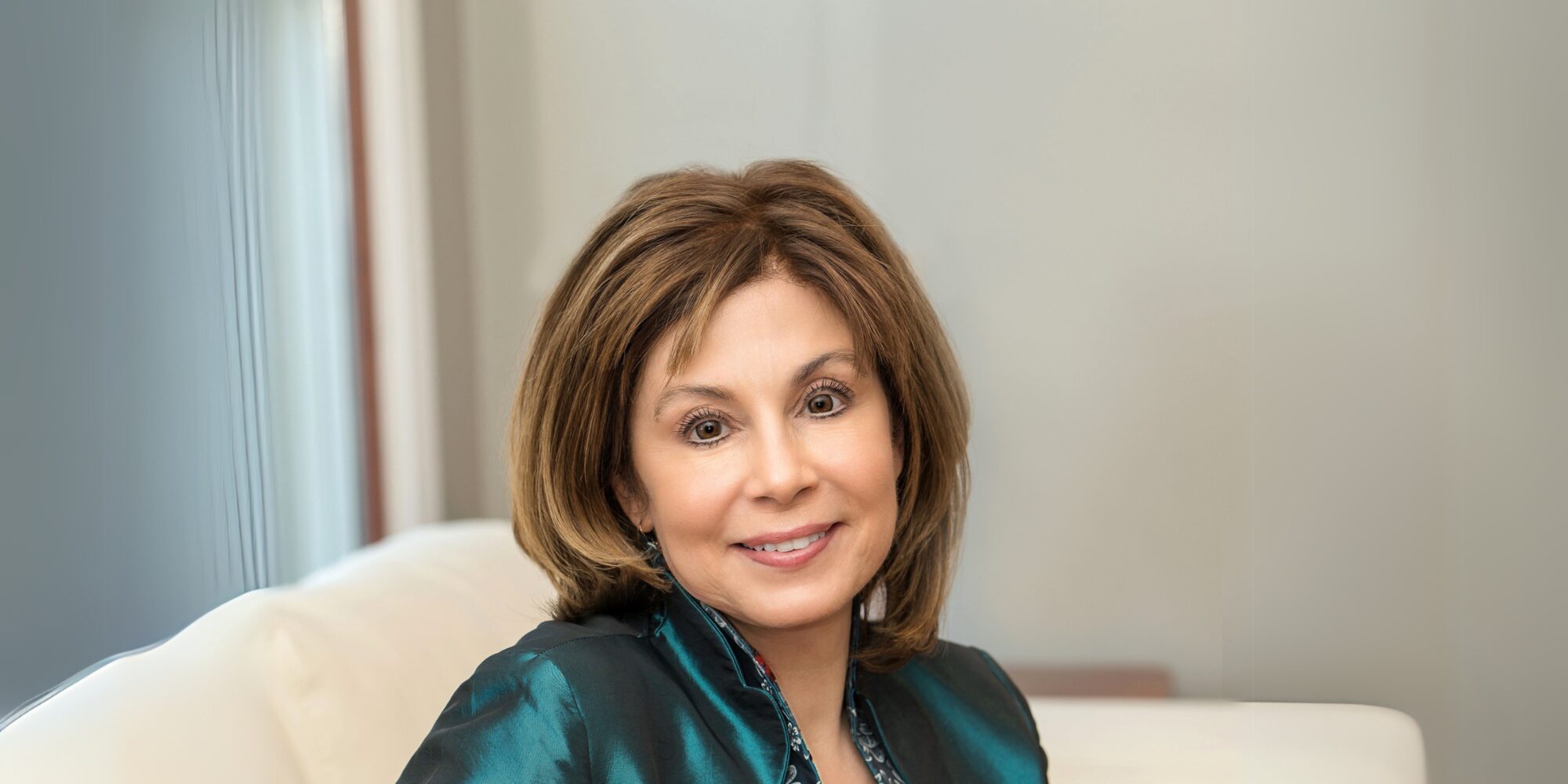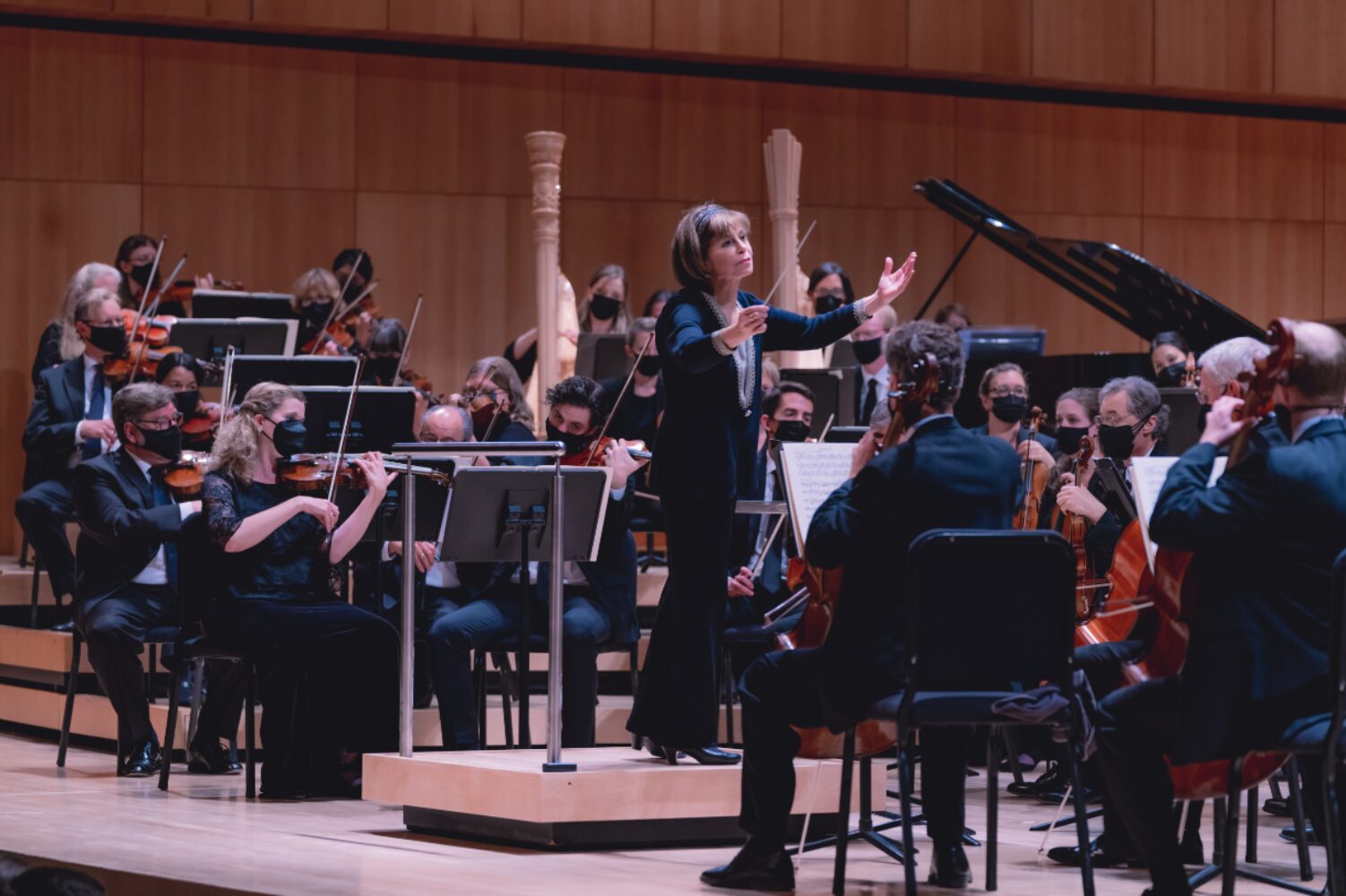
How music and art therapy shaped this original Omaha play
February 12, 2026
Principal Bass Nate Olson's music accompanied art therapy sessions which informed the writing of "Ways to Win the Woods."Tuesday, September 23
We sat down with Maestro JoAnn Falletta, the acclaimed Music Director of the Buffalo Philharmonic and newly appointed Principal Guest Conductor and Artistic Advisor of the Omaha Symphony, to discuss the finale of our first 25/26 Masterworks concert before rehearsals began.

1. Why did you choose Tchaikovsky’s Fifth Symphony to kick off the Omaha Symphony’s 25/26 Season?
It ends in such sublime joy. And I thought, this is the opening night. It's a new season ahead. And it should be happy. It should be exciting. It should be dramatic. And I think that a lot of people who've missed the orchestra are really ready for opening night. It should be something that is a powerhouse, and Tchaikovsky is. It is very, a very, very happy piece, a piece filled with hope and inspiration. So, I thought that that would be great. I think the orchestra has also not played that particular Tchaikovsky Symphony recently, so it'll be kind of fresh. For me, too. haven't conducted it for a little while, so it's very exciting.
I keep a log of my performances in my scores, really like a kind of a souvenir page. I was just looking over the concerts I had done with the orchestra here, and it brought back so many memories. So, I can tell you exactly when I did it last, which was 2019.
Five, for me, is the most fun [of the Tchaikovsky symphonies]. It's the most fun, and it's the most extravagant. Even in moments of sorrow, it's so extravagant and beautiful.
2. So, it has been six years since you've performed Tchaikovsky's Fifth. Is there anything about this symphony that has stood out to you or resonated differently as you have prepared for this weekend’s concert?
Well, for me, six years is a long time. So, I was, in a sense, relearning it. Like looking at an old friend, but becoming reacquainted again. And I guess we always change our feelings a little bit about the piece. I saw some things that I thought we could experiment with in terms of slightly different tempos and different approaches in some ways, but basically it's Tchaikovsky’s life. And I think that's why people love Tchaikovsky, because he's so open about what he writes. It's his history, and it starts out very dark and very kind of lost, which I think he felt many points in his life. And he goes through that, and in the end, everything is going to be all right. As opposed to the Sixth where we know at the end, everything was not going to be all right, but everything is going to be possible.
I saw a lot of new things, but what I really will learn from is when we start working tomorrow on the piece, because the orchestra is going to inform me about who they are through that piece. As we play, I'll be doing a lot of listening at first and not stopping so much in the first half hour or so to feel who they are and how they think about this and how they like to play and how willing they are to take chances. From working with them before, I know they are. They're willing to be very sensitive to music that they're in, and very willing to try things differently. So, that's going to inform this particular Tchaikovsky Five. It won't be like anyone else's, because it's going to be ours together.

JoAnn Falletta conducts the Omaha Symphony in October 2021.
That’s the best thing about being a conductor - that everything depends on the orchestra. The orchestras have all these great musicians. They have their personal view of all of this music, and that's what makes it so exciting to work with them, because I'm always taking in ideas and inspiration from what I hear.
3. Does the Omaha Symphony have any unique strengths that you are looking to showcase in this concert? How do you kind of anticipate the orchestra will impact the programming as this week unfolds?
From my experience with them, and I remember clearly three concerts we've done together - big repertoire and difficult concerts - there's a sense of adventure here. There's a sense of real risk taking, and not at all rigid, not at all. This is the way we always play it or let's play it safe. None of that. There was always this feeling of passionate commitment to moving with the music. I think that's what is going to make it special, that feeling of going on that journey with Tchaikovsky in their voice. I know that they'll be very abandoned about it, because they always were. Last time, we did Respighi; Pines of Rome and Fountains of Rome. It was awe inspiring. So, I hope that this will be the same. I know it will be.
4. Does Tchaikovsky’s Fifth present any particular challenges to you as a conductor?
Well, it does in that he is telling a story, and not in words. We don't know what the words are. We can imagine anything, but I have to be sensitive to the nuances of that, to shifting tempos, to colors that we hear, to extremes of dynamics. It’s not just playing notes on a page with Tchaikovsky. It's telling his life. So, that means we have to be very flexible. I have to be very flexible in planning out the structure of it. And that can be challenging, but in the end, that structure is the story.
It’s interesting to have Tchaikovsky's life unfolding in this music and have an entire orchestra's worth of perspectives on that story. And you're kind of in the middle, pulling those things together.
It’s no one person's piece. I mean, when Tchaikovsky wrote it, he gave it up. He gave it to us and gave it to orchestras everywhere, and it becomes our piece, in a way. Our impression of his heart. When I am in front of the orchestra, I will be trying to take their impressions of what's happening. It makes it unique. And that, for me, is the most exciting thing about this piece, and about being a conductor in general.
5. At this concert, the orchestra is playing two pieces before the big finale: John Adams’ Short Ride in a Fast Machine and Rachmaninoff’s Piano Concerto No. 3. What makes those two pieces a good fit to pair with the Tchaikovsky?
I mean, John Adams is an American genius. It’s a very short piece, Short Ride in a Fast Machine, which is about his kind-of frightening experience of getting into a friend's sports car and wishing he hadn't. It’s very exciting. It's very passionate as well, but in a very different way than the Tchaikovsky, which is talking about feelings. This is just supercharged from beginning to end. It's a bit of a, you know, perpetual motion, where once that car starts going, you just hang on. The rhythms are difficult, but in the end, it's like John himself. He uses a lot of inspiration from rock, from popular music, from jazz, and it's him. This is like five minutes of “Who is John Adams.” I thought that I would want to do an American piece too, because I always like to try and play living composers. I think people enjoy it. It's a nonstop rush to the end.
Then the Rachmaninoff Piano Concerto No. 3. I've done this with George Li before, and I think George might be making his [Omaha] debut. So I'm really glad about that, because that's nice to bring a new person. He's fantastic player, and he really plays the Rachmaninoff Third so well. And Rachmaninoff, of course, is as Russian as Tchaikovsky, but a whole different world. Of course, he looked back to Tchaikovsky as the greatest Russian composer of the time. All of the Russian writers did too.
But in writing his piano concerto, we have maybe the greatest pianist of all time writing a piano concerto. The people say that Rach Three might be the hardest piece ever written for piano, but it was written by a pianist. There’s something special about that. There's something about him in there. He played that piece. He wrote it for himself. I think it will offer Russian music, yes, but a different kind of Russian music, very passionate as well.
Anything else you would like to add?
I just want to say how thrilled I am to begin this relationship with the orchestra. I mean, I feel like I've had a relationship, and I've always looked back at those times as being very special. Just wonderful, wonderful musical experiences. But now I feel like I'm, in a way, part of the family, and it feels so good. I'll get to know people in a much closer way. Thank you to everybody for inviting me to be a part of your world. I'm really thrilled for that.
You can watch JoAnn Falletta and the Omaha Symphony bring Tchaikovsky's Fifth Symphony to life at our Masterworks season premiere, Falletta Conducts Tchaikovsky's Fifth, on September 26 and 27 at the Holland Performing Arts Center! Click below to learn more and get tickets.
Love the Omaha Symphony?
Be the first to learn about new concerts, stories, and special offers.